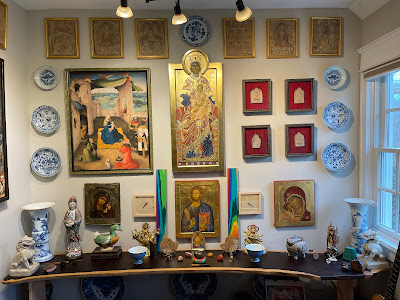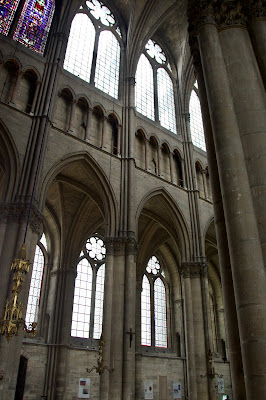Friday Jan. 15
I’m in the stillness this morning, pondering value, tradition, and effort.
I need to value life and what it is as it is. Life extends itself into time at great depth when I'm present to it. To the extent that I am present to it. Each day is a whole life.
Life comes from a tradition. It's not just the tradition of biology and evolution, although that is important. It's the tradition of thought, being, of family and society, of relationship and trust. We can't break biology and evolution; they belong to a world larger than the world man. But these other traditions, the ones that belong to our world, those, we can break all too easily. If we don’t begin with the value of life, we'll mishandle them and drop them and they'll break like a china teacup.
Life requires effort. Effort is the engagement with this material world. That engagement extends into the spiritual, but it begins here in the material. Effort is physical. Only after it's physical can it reach towards the spiritual. We need to struggle with what we are, the way we behave, with our ideas of ourselves.
In this sense, value represents feeling. Tradition represents intellect. Effort represents the body.
There’s another thing that struck me earlier this week.
There’s always an end — here, there, and everywhere. Things always have an end.
But where do they begin?
I can see ends all around me. Every result, every consequence is an end of one kind or other. Those things are fairly easy to perceive. Yet it’s much more difficult to perceive the beginning of anything, because one can only know when something which ends began after the end is here. Very often — almost always, in fact, unless one is predicting some physical result in science — things begin and the end of them is nowhere in sight. It can't even be imagined. Later, after a thing most extraordinary (sometimes, disastrous) takes place, everyone says, “who would have thought that could happen?”
The beginning wasn’t identifiable; it didn’t make its results visible.
Yet if we don’t penetrate to the beginning of our question, we can’t really know where we are. It reminds me of Gurdjieff’s story of the Karapet of Tiflis; he got there first. As I’ve mentioned before, Peggy Flinsch, who knew Gurdjieff well, tells us that he put that story in the book at the very end of the process, after the whole book was written and deemed complete. It was, in other words, an addition to this vast work. One could call it, so to speak, Gurdjieff’s final word — a second final word that came after Beelzebub’s final advice that mankind would need to grow organ that made him perpetually aware of his death if anything were to be done on the order of healing.
I’m also reminded of a friend’s story. He was present when someone in the room asked Lord Pentland, “What do you know that I don't know?”
Lord Pentland answered, “I know to begin again.”
Pentland wasn’t searching for the result.
He wasn’t searching for why there was a result.
He was searching for the beginning.
There are questions here about the role of intention.
Our question forever lies in the beginning of things where we are; not in what takes place later. The ordinary mind is accustomed to seeking its answers in the past and deriving its anxieties and pleasures from the future; but it all takes place in a now that it forgets.
The ordinary mind needs to be trained to be here, now, in the beginning, and to open itself to the beginning without prejudice.
This is where time flows in and slows itself to match the tempo of one’s contemplation; and that is where the stillness begins.
May you be well within today.
Lee
Lee van Laer is a Senior Editor at Parabola Magazine.








